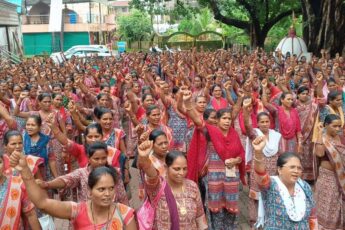
by E.A.S.T. (Essential Autonomous Struggles Transnational)
The feminist network Essential Autonomous Struggles Transnational (EAST) invites all women, LGBTQI+ people, migrants, workers, labor organizers and activists to an open discussion on the state of the essential struggles in Eastern and Central Europe and beyond in the current post(?)-pandemic context. The event will take place online (Zoom and live on the EAST’s Facebook page) on Sunday 24th of October, from 18 to 20 CET.
The EAST network emerged amidst the outbreak of the Covid-19 with the main vision to connect and amplify the voices of feminist, LGBTQI+, labor, anti-racist and migrant struggles in Central and Eastern Europe (CEE) and beyond. After more than a year of common work, we have issued the bilingual volume “Essential Struggles: Pandemic fronts”, that offers valuable insights on the struggles in the field of social reproduction that emerged or were intensified during the pandemic. The publication is a reflection on the status of the essential struggles in our regional and the broader transnational contexts by the end of 2020.
While this book is the starting point for our discussion, the new post-pandemic reality calls for reactivating the debate on the current state of affairs, in order to take stock of the struggles of the past two years and track any emerging struggles. For instance, after the end of the lockdowns, national and European-level “recovery” plans are unfolding at full speed and make it necessary to produce a feminist and transnational stance on post-pandemic reconstruction. Recovery plans are not just intervening on production but also on social reproduction as the welfare/housing/family reforms show. One pressing question is how the patriarchal structure of neoliberal society is redefined in order to embrace the new priorities of reconstruction.
On the 1st of July we protested against patriarchal violence and the simultaneous attacks on Istanbul Convention and women and LGBTQI people within a racist and exploitative regime. CEE is the core of this backlash that aims to revitalize the family as an institution but patriarchal and racist violence rages everywhere, albeit with different intensities. As recent declarations and measures issued by the governments in Turkey, Hungary and Poland show, the assault on sexual freedom goes hand in hand with the attempt to put women back into their supposedly natural roles as mothers and caretakers. Another question then is how to continue to foster connections between feminist struggles against violence against women and LGBTQI people.
After quarantine measures have ended, forced evictions are happening again all over Europe, even though the pandemic hits harder than ever in some parts of the continent. Without the safety of adequate housing, many people, especially working classes, Roma people, migrants and other socially marginalised groups struggle to get by while struggling with work, taking care of their families, school, and health issues. Due to the ongoing neoliberal financialization of housing, renting prices are too high for too many in too many places. How can we fight for adequate and social housing on a transnational level and from the so-called margins?
The situation on the Eastern borders demonstrates that pushbacks and the militarization of the border are a backlash against migrants’ capacity to challenge the EU border regime and internal (un)democratic rules. But this situation also questions the way in which social movements and trade unions organize and mobilize. Moreover, the Afghan crisis and migrants’ movements across and against the borders, post-pandemic recovery, patriarchal attacks are just a few elements of the current scenario. Where do we see opportunities to intervene politically? How can we increase our capacity to struggle collectively and transnationally for freedom of movement?
Essential work was at the foreground of the pandemic. While it gained high visibility, it became subject to extreme exploitation. The essential character of the work performed by women and migrants as nurses, care workers, cleaners, logistics, agriculture and factory workers still shows the urgency of their struggles in order to overturn neoliberal social reproduction. EAST released a manifesto for March 8th 2021 to call for an essential strike against patriarchal violence, institutional racism and exploitation. Building on this discussion, a final question is what the conditions are today for an essential strike.
See you all at the book presentation and open online debate on Sunday, 24th October, from 18 to 20 CET. To participate in the Zoom, click on this link: https://us02web.zoom.us/j/84295890228
++++
Format:
The event will be separated into two parts. In the first ~ 40 minutes we will have panelist presentations (speakers to be confirmed). Afterwards we will have an open floor discussion with everyone present.
Speakers:
– Sanem Öztürk, Women’s Solidarity Foundation (KADAV) (Turkey)
– Enikő Vincze, Căși sociale ACUM / Social housing NOW (Romania)
– Yağmur Yurtsever, HDK Assembly of Migrants (Turkey)
– Magda Malin, Workers’ initiative (Poland)
– Kostandinka Kuneva (Bulgaria)
About the book:
The book “Essential Struggles: Pandemic Fronts” is a bilingual volume (Bulgarian and English) that is available free of charge digitally or as a hard copy. It was supported by the Friedrich-Ebert Foundation Bulgaria. The book can be obtained in the following ways:
Digitally (EN): https://www.transnational-strike.info/app/uploads/2021/08/levfem-english-print-1-1-1-3.pdf
Digitally (BG): https://levfem.org/pandemiq-feministki-frontove/
Hard copy (EN & BG; free of charge, free shipping all over the world): https://forms.gle/7UtD5V2oTGMWvxuk7





